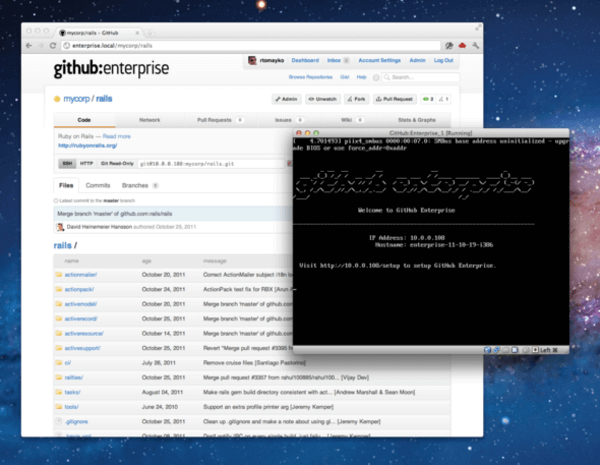Today GitHub rolled out GitHub Enterprise, a self-hosted GitHub instance that companies can deploy internally. If you’ve heard this song before, another company that specialized in catering to developers went “enterprise” and never quite managed to get any traction. Is GitHub headed down the same rabbit hole, or is the company likely to succeed where SourceForge failed?

SourceForge started out as open source software, then commercialized and retitled “SourceForge Enterprise.” After floundering for several years, it was sold to CollabNet in 2007.
In the interim, SourceForge lost a lot of its mojo. Developers using SourceForge to host their open source projects often complained about lack of features, service problems and so on. So is this history repeating itself, or is GitHub making a smart move?
Let’s look at what they’re announcing. First, you get the standard GitHub interface and tools that developers have come to love and use in vast hordes. Then they’ve added support for corporate authentication systems, backups, custom server-side git hooks and access over HTTP.

It turns out, this isn’t the first foray into GitHub behind the corporate firewall, but they’ve streamlined it so that companies can simply take an OVF virtual machine and run it on their virtualization of choice. So whether you’re using VMware, VirtualBox, Red Hat Enterprise Virtualization, or another virtualization platform that supports OVF, you’re good to go with an appliance.
Why GitHub’s Different
While I worked at SourceForge for two years, I was on the Linux.com editorial team. I wasn’t directly involved with selling or dealing with SourceForge, so I asked Ross Turk about his experience and whether GitHub was making the same mistakes.
Turk, who was a customer consultant providing support for SourceForge and later its director of community, says that he doesn’t see GitHub following the same path. “From a business perspective, SourceForge Enterprise Edition was trying to be heavyweight enterprise software, and had all of the overhead that comes along with it. They put people on planes to sell software, they sent engineers (like me, at the time) to provide training and consultation, they routinely made massive customizations for particular situations, and the pricing model was targeted to the wealthiest possible clients.”
On the flip side, Turk says that GitHub seems to be taking a much smarter approach. “I can’t imagine that Github will make those same mistakes; they seem to have options for long-tail enterprise customers. That’s good because it scales. That, along with their unique social coding experience, may allow them to succeed where SourceForge Enterprise Edition did not.”
In short, as long as GitHub doesn’t allow the enterprise product to be a distraction, they should be fine. Says Turk, “If they find themselves burning time and making product sacrifices to earn giant enterprise deals, selling enterprise software could turn into a giant distraction for them. But I haven’t seen them compromise their vision for short-term economic benefit yet… I have no reason to believe they will now.”
GitHub is providing a 45-day free trial, and pricing starts at $5,000 per year for 20 users. Licenses are purchased in “seat packs” for 20 users, and the company has licensing options for companies with more than 1,000 users.
What do you think? Is this a smart move for GitHub, or a potential pitfall? Is your company thinking about deploying GitHub Enterprise?

















